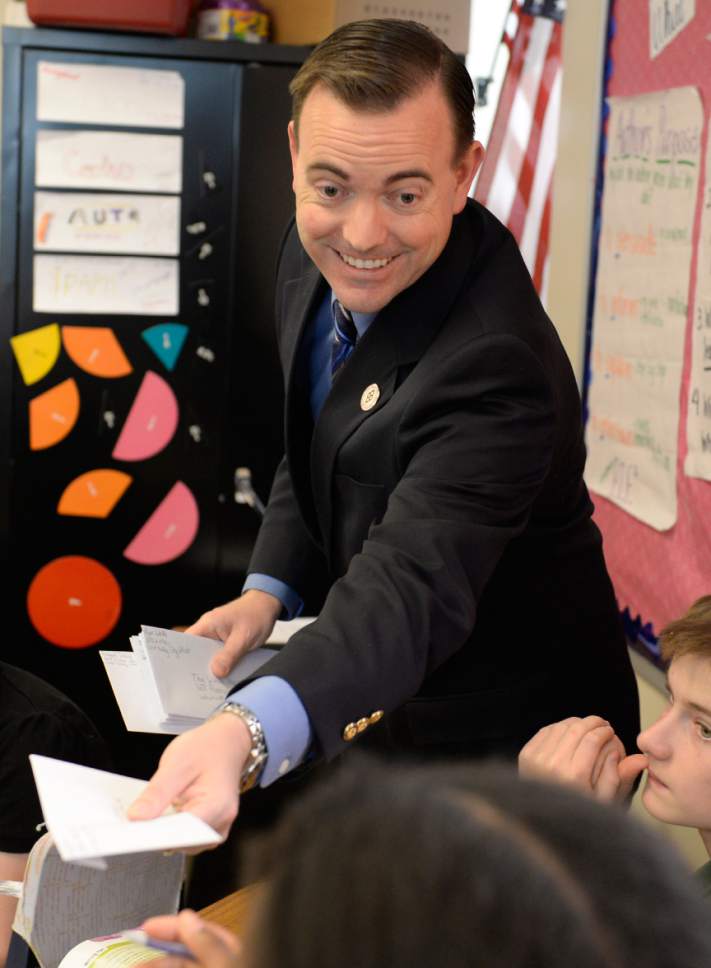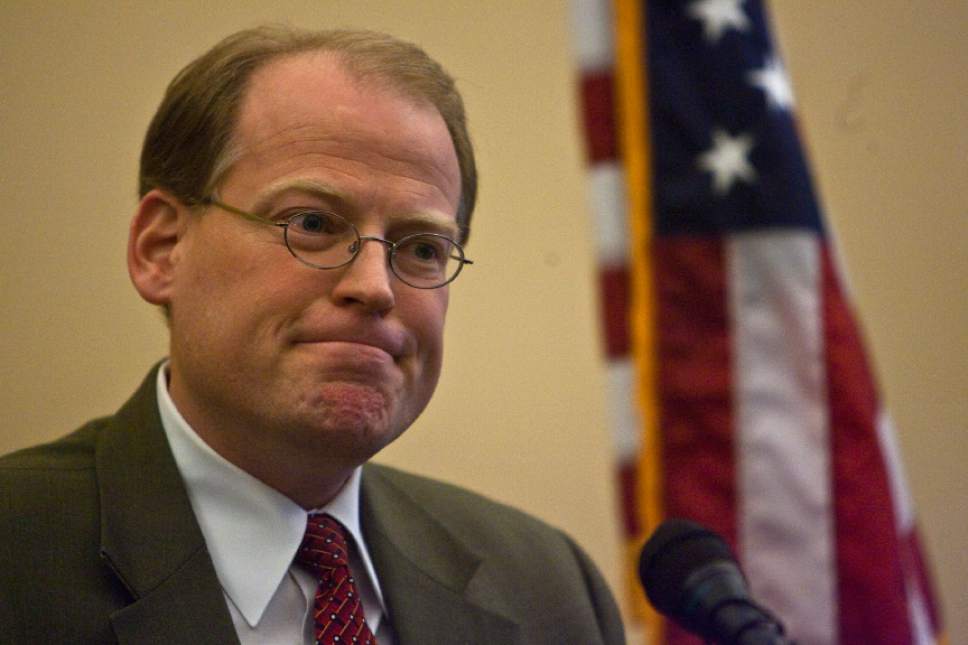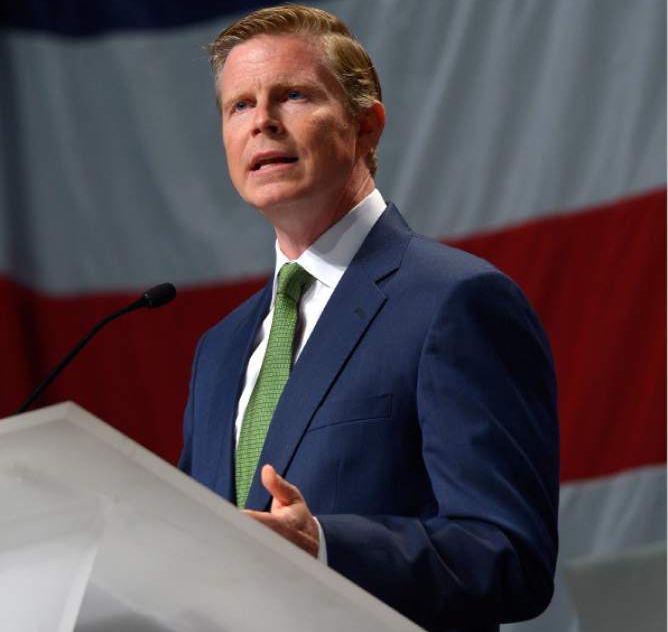This is an archived article that was published on sltrib.com in 2016, and information in the article may be outdated. It is provided only for personal research purposes and may not be reprinted.
One of every four Utah candidates for federal, statewide or legislative offices this year is using the new option of qualifying for the primary election by collecting signatures — a choice created by long political and legal battles.
Of the 263 candidates, 199 are opting for the traditional caucus and convention system, according to their campaign filing forms.
Sixty candidates declared their intent to use both systems. And only four chose to try to qualify just by collecting signatures.
Those opting for the different systems say they base their choices on what they see as most cost-effective, fair, representative, legal or healthy for the state's politics — and obviously disagree about which system actually does that the best.
State Rep. Kraig Powell, R-Heber City, is one of the four candidates who chose only to collect signatures. He obtained the 1,000 he needed to appear in the primary — and said he selected that route because he believes the caucus-convention system gives too much power to political minorities who often pack such meetings.
"What seems to happen is candidates get to pick their own delegates," he said. "They essentially work hard before caucus night. They make sure the people who support them are elected as delegates, and the process is easily manipulated or rigged."
He said in his district of about 37,000 people, 37 delegates have traditionally chosen the Republican nominee — and he would prefer letting everyone vote in a primary.
Powell also said too many officeholders become too beholden to delegates, who he said are not shy about calling and reminding them of their priorities — an undue influence he argues would end with direct primaries.
Rich McKeown, executive co-chairman of Count My Vote, makes many of the same arguments — which is why his group had started a ballot initiative that would have allowed voters to dump the caucus-convention system in favor of direct primaries.
"The idea to use delegates chosen on a certain night at a certain time when not all people can attend limits political participation," he said, adding that system tends to nominate people at the political extremes, disenfranchising mainstream voters and depressing turnout at elections.
Legislators enacted a compromise, SB54, to allow qualifying either by collecting signatures or by having enough votes at a party's state convention, whose delegates are elected in neighborhood caucuses. The Republican Party has been fighting SB54 in court.
Rep. Fred Cox, R-West Valley City, opposed SB54 and chose to use only the convention-caucus system this year. He did that even though a GOP opponent, former West Valley City Mayor Mike Winder, is using both methods, and already has collected enough signatures to qualify for the primary.
Cox said the caucus-convention system "creates an environment where someone does not have to be rich, famous or an incumbent to win." He said it is less expensive, because candidates can target a few delegates in person-to-person campaigning in their homes — instead of trying to reach all voters.
"I've always felt it is more fair and fought for it," he said.
Collecting signatures can be expensive and time-consuming, Cox said, adding that only 4,000 registered Republicans live in his district, and he would need to collect signatures from a quarter of them to qualify — and figures that would cost $6,000.
Of the 21 candidates who have qualified so far by collecting signatures, 16 are incumbents who tend to have more campaign cash — and one of the others is a current House member running for the state Senate.
Utah Democratic Party Chairman Peter Corroon agrees that many candidates chose the caucus-convention route because "it's easier to call delegates and bake them banana bread, which is what I did [when running for elected office]." He said many candidates also opted to avoid the expense of collecting signatures if they had no challengers in the party or faced weak opposition.
In fact, 77 candidates for federal, statewide or legislative office originally declared their intent to collect signatures. When they later actually filed for office, that number decreased to 64 — as some apparently figured it was no longer needed or decided not to run.
"It's lack of competition," Corroon said.
Utah Republican Party Chairman James Evans, who has sued trying to overturn the signature-collection option as interference with party business, said most candidates chose the caucus-convention route because "it's tried and true, there's no question it is constitutional … and then there's just the cost factor."
Republican Gov. Gary Herbert said in a recent debate that he chose to pursue both systems — and collected the 28,000 signatures needed to qualify for the primary — because the attorney general said that with legal challenges to SB54, that is the only way to ensure appearing on the ballot.
"So prudence is part of being a common-sense Republican. That's why I have taken both approaches," Herbert said.
"I'm putting principle over prudence," said his key GOP challenger, Jonathan Johnson. He argues that a primary allows heavily populated urban areas to choose nominees, while the caucus-convention system gives rural areas more of a voice.
Vaughn Cook, a Democrat running for governor, also is pursuing both methods. He said using paid signature collectors, as Herbert did, would cost him $150,000 to $180,000. "I didn't want to spend that kind of money, so we're organizing an army" of volunteers to seek them.
Cook said he still likes that approach because "the caucus system in the state has really led us to an extreme balance in the political parties. I think that perpetuating the caucus system ... is a disservice to the voters of the state."
His Democratic challenger, Mike Weinholtz, is following the convention-caucus route, but in a recent debate also expressed concerns that "fewer and fewer people in the caucus system are controlling who gets to run for office.… More is always better in a democracy."
Evans said heavy turnout at caucuses in recent years has helped ensure they are representative. He said opponents of caucuses — including former Gov. Mike Leavitt, who helped form Count My Vote — actually seem to acknowledge that in national politics, but not for the state.
He said Leavitt, in a Utah appearance for Ohio Gov. John Kasich, hoped for a contested national convention where delegates could choose someone other than GOP front-runner Donald Trump, who leads in national polls.
"They like letting delegates choose," Evans said, "when it suits their purposes." —
Qualifying by signature
Here are candidates who have qualified so far for the primary by collecting signatures:
U.S. Senate race • Sen. Mike Lee, R*
U.S. House District 3 • Chia-Chi Teng, R
Governor's race • Gov. Gary Herbert, R*
State Senate races • Rich Cunningham, R; Curt Bramble, R*; Allen Christensen, R*; Lyle Hillyard, R*; Todd Weiler, R*
House races • Carl Albrecht, R; Mel Brown, R*; Becky Edwards, R*; Steve Eliason, R*; Francis Gibson, R*; Steve Handy, R*, Mike McKell, R*; Dixon Pitcher, R*; Val Potter, R; Kraig Powell, R*; Scott Sandall, R*; Ray Ward, R*; Mike Winder, R
* Incumbent
Source: Utah lieutenant governor's office.







